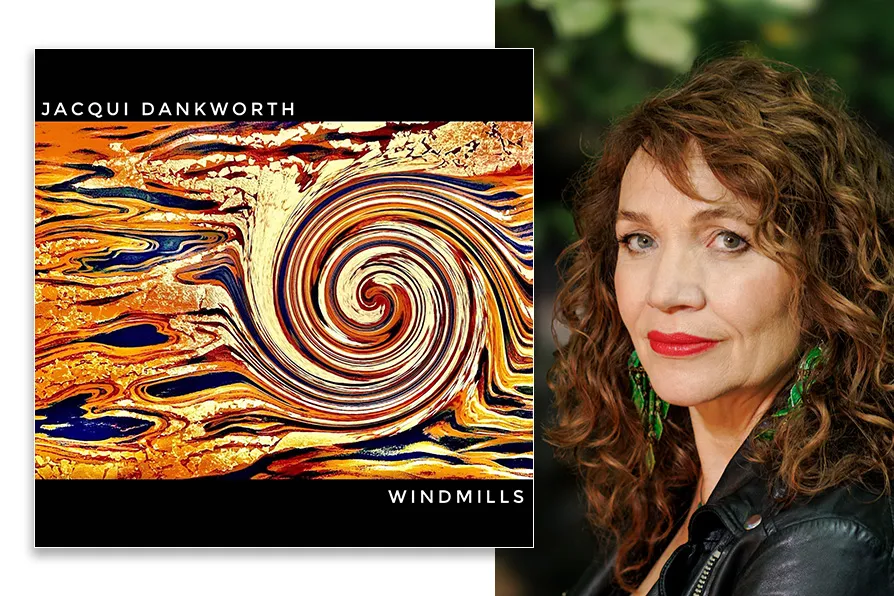The book feels like a writer working within his limits and not breaking any new ground, believes KEN COCKBURN
CHRIS SEARLE speaks to vocalist Jacqui Dankworth

 Jacqui Dankworth [Pic: Courtesy of dynamicagency.co.uk]
Jacqui Dankworth [Pic: Courtesy of dynamicagency.co.uk]
IT’S NOT easy for a talented daughter of two outstanding musicians to carve out a lifetime in music in her own right, but singer Jacqui Dankworth (born in 1963) has certainly done that with a beautiful excellence and originality.
As the daughter of John Dankworth (1927-2010) and Cleo Laine (born 1927), Jacqui is immensely proud of her parents, and not only because of their musical prowess. John was bandleader, alto saxophonist, orchestra maestro and composer much admired by the great Duke Ellington — Jacqui told me that her father was in awe of him and “almost crumbled when he was in his presence” — and Cleo, of course is a vocalist lauded in Britain, as well as Europe and America.
But much more than this. In the early 1950s Dankworth was largely ignorant of Apartheid when he took a band to South Africa to play in Johannesburg. Jacqui takes up the story: “As they were rehearsing in the theatre a black cleaner approached dad saying how much he loved his music and that he also played the saxophone. Dad said: ‘Then come to the concert tonight, I’ll get you a ticket.’ ‘They won’t let me in. I’m black,’ he replied.
“Dad never got over that and vowed never to play to segregated audiences again or return to South Africa while Apartheid reigned. It was an education for him. He became an active enemy of Apartheid wherever he went, publicising how evil it was all over the world. And he helped to get black musicians, like trumpeter Hugh Masekela, out of South Africa. After dad died I met him and he gave me a big hug. ‘That’s for you and your dad,’ he said.”
Jacqui carries this pride in her voice, always remembering these events. Her mum and dad were also founders of the Stars Campaign for Inter-Racial Friendship in 1959, established to combat the fascist White Defence League.
Her new album is Windmills, another expression of her protean imagination. “I’m not a folk singer or jazz singer, I’m a singer of songs,” she declares. “I’ll sing anything!”
I think the first time I heard her sing was Ben Webster’s Mood on the 1996 Michael Garrick album, For Love Of Duke … And Ronnie. When I reminded her of that she sang it wordlessly down the phone to me; it still sounded beautiful.
But how has her voice changed since those days, singing in a multiplicity of styles — and acting too — including opera?
“I‘ve a lot more confidence now. I bring all my life experiences into my songs, my sound and range is much broader.”
With pianist Charlie Wood as arranger and accompanist, the Carducci String Quartet and saxophonist Julian Siegel as guest conductor of The BBC Big Band, the versatility of Jacqui’s soft-focused and serpentine voice, the rises and falls of her notes and the way she lingers patiently over key words such as “day…” in London By Night, all compound some memorable performances.
“We had already arranged the songs and performed them many times live, so we thought, why not make an album of them?”
What is her favourite track?
“I find listening to myself very difficult, but I like So Many Stars, the Sergio Mendes song, particularly, with Sammy Mayne’s superb alto saxophone solo, and Stephen Sondheim’s Send In The Clowns.”
For me, I find the sadness and pathos of If You Go Away very moving, a contrast to her voicing of Lucky To Be Me, where the string quartet comes to the fore in a sound of pure happiness and optimism. Jacqui’s own song, Will You Wait For Me, and its invocation of seasonal change and the steadfastness of love which overcomes it, is expressively sung alongside Wood’s tolling piano obbligatos and Oli Hayhurst’s plangent bass.
If you’re anywhere near my age, her beautiful, swooping voice will remind you not only of her parents’ lifetime achievement, but of a woman taking her own road through her own unique and very different musicianship, marking her words and the lyricism of her voice with a special passion and artistry.
Windmills is released by Perdido Records










